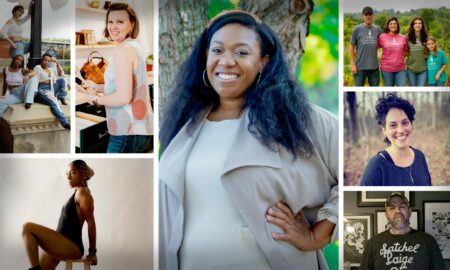

Today we’d like to introduce you to Ajanae Dawkins.
Ajanae, we appreciate you taking the time to share your story with us today. Where does your story begin?
It’s difficult to pinpoint only one origin story for my work as a writer, performance artist, and theologian. For example, even though I cannot remember it, I’ve been told that I start singing in my grandfather’s pulpit when I was 3 years old. Apparently, I didn’t know any gospel songs, so I would sing only the Barney theme song. This was my first experience regularly being on a stage. For years, from elementary to middle school, I wrote poems and didn’t know that they were poems. In my adolescent world of Tumblr, myspace, and other socials, I saw my writing as a kind of digital content. I had to be about 12 when I first came across Def Jam Poetry on YouTube. I sat up late watching Suheir Hammad and Rafael Casal and knew immediately, “This is what I do.” From there, it really has been about divine intervention, the labor of love of my family and peers, luck, a compulsion to create, and the frustrating condition of being unable to escape my own sensitivity to the world. It was Detroit’s InsideOut Literary Arts Program for teens and the incredible mentors like Aricka Foreman. It was my grandparents using their retirement to drive me back and forth from writing workshops. It was my tenure in Madison, Wisconsin as a Hip-Hop and Urban Arts scholar that let me experiment with playwriting and performance styles beyond slam poetry.
It’s been almost five years since graduating, relocation to Michigan and then Ohio once I got married, two more degrees, and a settling into myself as an artist. Right now, I’m experimenting with theological essays and memoir, literary criticism, another one-woman show, and a poetry manuscript. The more settled I feel in the poetry tradition, the easier it feels to explore the tentacles of my imagination in other creative forms.
Can you talk to us a bit about the challenges and lessons you’ve learned along the way? Looking back, would you say it’s been easy or smooth in retrospect?
Something that has made my journey more difficult was a very late diagnosis of ADHD. There’s a term “twice exceptional” which refers to a child who is gifted and also has a disability. In the best-case scenario, a twice-exceptional child receives support both for their giftedness and for their disability. Far too frequently, the case is that it is difficult for educators who would keep an eye out for characteristics of neurodivergence or learning disabilities cannot see these characteristics in gifted students because of the ways the excel. I think it was easy for my neurodivergence to be disregarded because I was a Black girl in a predominantly white school because I had little motivation for subjects outside of my interest because I was loud and boy-crazy. By my teachers’ assessments, I was not neurodivergent, I was simply not living up to my potential. I was too sensitive, and I chose not to focus in class because I was focused on all the wrong things. I had a much more difficult time than necessary in school, managing my relationships, work, social situations and regulating my emotions. I often wonder what kind of student I might have been if I’d had appropriate accommodations. Or what my self-esteem might have been like if I’d had the language for what was happening to me.
Appreciate you sharing that. What else should we know about what you do?
I’m a poet first, but I write other things. I write theology essays and plays. I’m experimenting with visual poetics. Performance work feels just as significant for me as my work on the page. There is a way that my body has the capacity to carry and deliver my work that feels significant. Oral storytelling traditions remain a vital part of my practice as an artist. I never want to read my work and sound afraid or unsure of it. I always hope that the way a work transforms in my body will prove it as living. I am most proud of the way my work has always centered the narrative lives of Black women and the way it takes faith seriously. Right now, my work is evolving to think more about the ethics of storytelling, pleasure, and the erotic and the unorthodox places that we find God.
If you had to, what characteristic of yours would you give the most credit to?
This is difficult to say. When I was younger, I likely would have said something about my perseverance or commitment to art. Today, I would say my commitment to community. Community is not a means to success, but they are who carry you as you navigate the very complicated journey of being a working artist. Community has expanded my imagination, offered me correction, and shaped my capacity for empathy. Without community, I would not believe in the work enough continue. Without community, much of my work would have died in its earliest drafts, not asking any more probing or difficult questions. I cannot manipulate success as an artist. My success is in the work I do when I’m alone when no one else is watching. My success is in how I show up for other Black writers as they also navigate this world. That is what I can control.
Contact Info:
- Website: ajanae.com
- Instagram: https://www.instagram.com/moonsatdusk/
- Facebook: https://www.facebook.com/ajanae.dawkins
- Twitter: https://twitter.com/MoonsAtDusk








Image Credits
Matthew Pitts











